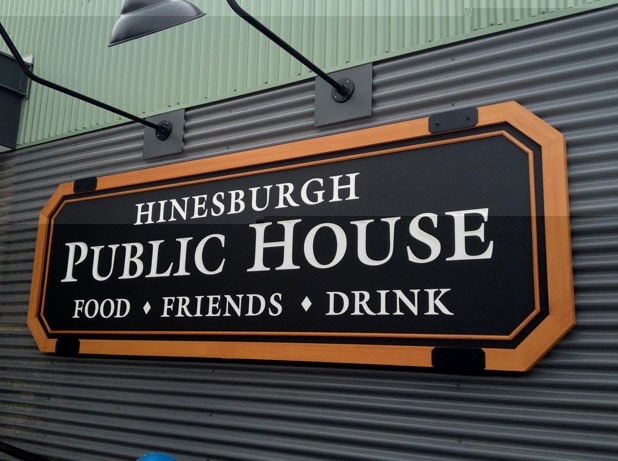
Like many Hinesburg residents, you may have driven past the town’s newest restaurant, the Hinesburgh Public House, and wondered how owners Will and Kathleen Patten must feel about the major typo in its name: the extra “h” at the end of “Hinesburg.”
People “think we’ve made a mistake and don’t want to spend thousands of dollars trying to fix it,” says the restaurant’s managing partner, Thom Dodge, with a sigh. Apparently the staff has been defending that “h” from the moment the signage went up.
However, if you’re one of the passersby who assume these restaurateurs can’t spell, think again. The extra “h” actually pays homage to the town’s history, but that story isn’t simple. Nor are the stories of the existing, or missing, “h” in the names of six other Vermont towns ending in “burgh” or “burg.”
Alburgh, Ferrisburgh and Enosburgh were chartered with an “h” that once was lost but now is found. Lunenburg, Searsburg and Irasburg were chartered with an “h” that each town has yet to reclaim.
So where did the “h” go?
Vermont State Librarian Martha Reid explains: “In 1892, the U.S. Board on Geographic Names published a report which included a recommendation that town names ending in ‘burgh’ be spelled as ‘burg’ in order to standardize names across the country for use on federal maps and in federal documents.”
“H”-dropping also seemed to make life easier for post offices.
But the story behind Hinesburg’s one-time extra “h” is less clear. In fact, state representative and unofficial go-to historian Bill Lippert suggests it’s a bit of a mystery. Hanging on a wall in Hinesburg Town Hall today is a transcription of the Town Charter from 1762 — a handwritten document in which the village is referred to both with and without the extra “h.”
“So, at least according to this transcription of the entry into the Book of Charters,” Lippert explains, “our town was originally chartered as Hinesburg, only to soon after, at least by early 1763, start being referred to as Hinesburgh.”
Just as many current residents disagree on whether the “h” should be restored, history reveals that their ancestors couldn’t make up their minds, either.
“Throughout the period 1908 to 1912,” Lippert continues, “spelling of the town’s name on the official Town Meeting Reports moved back and forth. Hinesburgh appeared on the cover in 1908. Hinesburg returned in 1909 and 1910, then back again to Hinesburgh in 1911. Finally, from 1912 on, all town reports, and other official local town documents, consistently adopted the new spelling of the ‘Town of Hinesburg.’”
Just last summer, as Hinesburg celebrated its 250th year of existence, the town’s public weekly newsletter referred to the new restaurant’s zoning approval without the extra “h.” Was this a spiteful gesture from a writer who disagrees with the old-timer spelling — or simply a thoughtless typo? We’ll never know.
What would it take for Hinesburg to get its “h” back? Lippert explains the process: “It involves having a vote of the town, or local selectboard, and then going through the Vermont Board of Libraries, which under Vermont law is charged with making official the names of towns and geographical sites throughout the state. Once that is done, the federal designation must still be approved, but becomes more of a formality.”
The town of Ferrisburgh has taken the lead.
In 1990, Ferrisburg[h]’s town clerk decided enough was enough: The town needed its “h” back. Reid says the Vermont Board of Libraries received a petition with at least 25 signatures from the town, which was followed by a hearing that officially ordered the spelling of “Ferrisburg” to return to “Ferrisburgh.” (Never mind that, according to Reid, the town has also gone by “Ferrissburg” and “Ferrisbourg.”)
Current Town Clerk Chet Hawkins says the decision was by no means universally popular. “Many of the old-time residents say, ‘Get the ‘h’ out of Ferrisburgh,’” he notes.
Alburgh, on the other hand, reclaimed its precious consonant in 2006. Like the owners of the Hinesburgh Public House, residents there merely wanted to honor their town’s historical name, or at least one of its historical names. They did so by taking a vote at a town meeting, which led former Vermont State Librarian Sybil McShane to order the spelling change. Now most Alburghers sleep peacefully at night knowing their “h” has been restored, while others continue to bemoan its return.
Good to know, at least, that the “h” discrepancies are the result not of sloppy spelling errors but of human indecision.
“Personally,” Lippert says, “I like that Will and Kathleen Patten have incorporated ‘Hinesburgh’ into the name of their new establishment.”
While the town currently has no plans to officially reclaim its “h,” the restaurant’s signage provides a persistent reminder that something is









Comments
Comments are closed.
From 2014-2020, Seven Days allowed readers to comment on all stories posted on our website. While we've appreciated the suggestions and insights, right now Seven Days is prioritizing our core mission — producing high-quality, responsible local journalism — over moderating online debates between readers.
To criticize, correct or praise our reporting, please send us a letter to the editor or send us a tip. We’ll check it out and report the results.
Online comments may return when we have better tech tools for managing them. Thanks for reading.